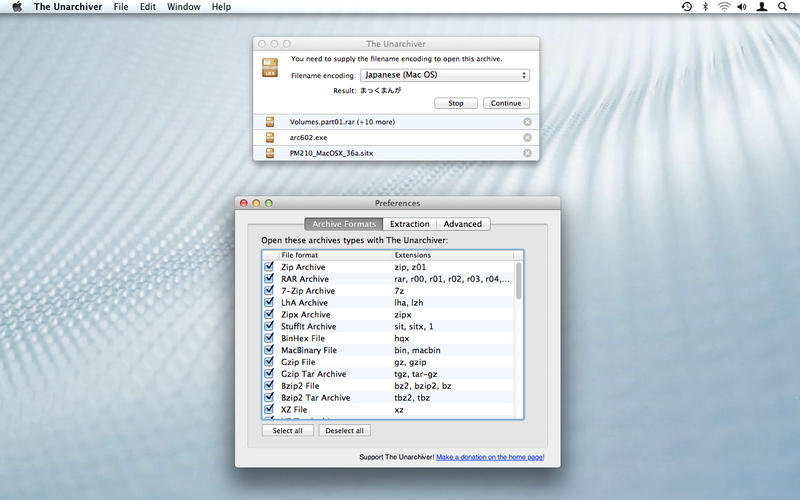Zip Files On Mac For Windows

A command line multi function tool. Depeche View command line free external tools, zero install effort, usb stick compliant: java sources cpp sources articles Create Zip files on the command line very easy and flexible. Include/exclude sub folders and file names, or zip just files changed today, with the free Open Source tool Swiss File Knife for Windows, Mac OS and Linux.
Learn how to quickly and easily unzip Cedille Records split zipped albums. Found on Windows and Mac platforms can't unzip the split files appropriately but. Yes OSX can open ZIP files that use ZipCrypto as it is a fairly basic form of encryption. Similar to Windows - OSX has built-in support for decrypting ZIP files and there are plenty of apps too.
- download the free Swiss File Knife Base from. - open the Windows command line, Mac OS X Terminal or Linux shell. - OS X: type mv sfk-mac-i686.exe sfk and chmod +x sfk then./sfk - Linux: type mv sfk-linux.exe sfk and chmod +x sfk then./sfk OS X and Linux syntax may differ, check the help within the tool. Sfk zip out[.zip] [opt] mydir [file1 file2.] sfk zip out[.zip] [opt] -dir mydir -file file1 file2 add files and folders to a.zip file.
About filename encoding if filenames contain special chars like umlauts or accents the following applies: - under windows, sfk zip stores filenames 1. In the OEM codepage of your system, to support old extraction tools. And as UTF-8, in the zip format 0x7075 extension which will be used by up-to-date programs.
- under linux, sfk stores only one name, which is marked as UTF-8, if such encoding is detected. On any other encoding, like accent chars on old file systems, sfk zip stores characters as is, and later extraction may produce wrong names. - UTF-8 name extensions are supported only by up-to- date zip extraction tools, like 7zip, Windows 10 File Explorer, or sfk unzip. - names with accent chars exchanged between Mac and Non-Mac systems may look wrong due to Decomposed Unicode used in Mac OS/X. If you extract files at the receiver, then open windows explorer and see unexpected filename characters, this means the receiver's unzip tool is old and does not understand UTF-8 extensions.
- if you just see wrong accent characters it means the receiver system uses a different OEM codepage then the sender (sfk sysinfo). - if you see #Uxxxx it means filenames contain complex unicode chars, like asian or cyrillic. You can google for U+xxxx to see what character is actually meant. No update of existing content if the output zip file already exists then only new files which are not already contained can be added.
Sfk cannot update contents and times within existing zip files. Sfk zip may fail to compare added filenames to existing names in a zip if name encodings are mixed or unclear, esp. On linux/mac. 64 bit zip file support if contents are larger then 2 gb, sfk zip will create a 64 bit zip file automatically.
Not every unzip tool may be able to read this. SFK XE cannot read zip file contents over 2 gb. Options -nosub do not include sub folders. -force overwrite existing zip file. -zipext add.zip to output filename even if it already has an extension.
Mac os high sierra problems. -asdir x create a new folder x within the zip and add all files into that folder. Cannot add to an existing folder.
-rel[names] strip top level folder from filenames within the zip. -big show a summary of largest files. -big=n show a summary of n largest files. -old=n show a summary of n oldest files. -nosum show no summary. -text include only ascii text files but no binary files.
-nometa do not add the os/code comment, or set SFK_CONFIG=nozipmeta -setexec mask1 mask2!mask3. Mark files as executable with linux/mac operating systems. Must be followed by -dir. -offtime store file times which are one hour off, depending on DST. For details see: sfk help offtime output filename rendering if output filename does not contain '.' Then '.zip' is added.
Use -zipext to add whenever if it does not contain.zip output chaining sfk zip supports text output chaining, to pass filenames for filtered display. See also sfk zipuni use just UTF-8 filenames, to support old linux tools. Sfk extract a zip file. Sfk zip files selected by a previous command. Sfk zip is very flexible and easy to use, but if you need special features like direct zip file updating you may consider further zipping tools. Find an overview on: examples sfk zip out mydir!bak add all contents of mydir into out.zip, except for.bak files, using the short file selection syntax. Sfk zip out -dir foo bar -file!bak add all contents of folder foo and folder bar into out.zip, except for.bak files, using the long file selection syntax.